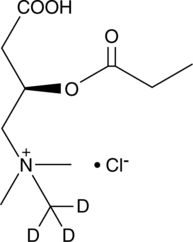Territorial Availability: Available through Bertin Technologies only in France
- Synonyms
- (2R)-3-carboxy-N,N-dimethyl-N-(methyl-d3)-2-(1-oxopropoxy)-1-propanaminium, monochloride
- Correlated keywords
- 1334582-69-2 GCMS LCMS PGE 6keto TXB 2 PGF 1? NAD PH NOX 4 ICAM1 ST261 ST 261 Dromos PGF1? deuterated deuterium noncontaminated
- Product Overview:
Propionyl-L-carnitine-d3 is intended for use as an internal standard for the quantification of propionyl-L-carnitine (Item No. 9001873) by GC- or LC-MS. Propionyl-L-carnitine is a naturally occurring carnitine derivative formed by carnitine acetyltransferase during ?-oxidation of uneven chain fatty acids.{24843} Propionyl-L-carnitine increases the basal release of prostaglandin E2 (PGE2; Item No. 14010) and 6-keto Prostaglandin F1? (Item No. 15210) in carrageenan-stimulated isolated rat peritoneal cells contaminated with neutrophils and increases the basal release of thromboxane B2 (TXB2; Item No. 19030) in non-contaminated cells.{24843} It reduces the production of reactive oxygen species (ROS) and decreases the expression of NADPH oxidase 2 (NOX2), NOX4, and ICAM-1 in human umbilical vein endothelial cells (HUVECs). It also increases the rate of revascularization and the hind limb vascular area in a rabbit model of hind limb ischemia when administered at a dose of 10 mg per animal.{47116} Propionyl-L-carnitine reduces mitochondrial dysfunction induced by ischemia, preventing mitochondrial calcium overload, and depletion of ATP tissue stores in a rabbit model of ischemia.{47117}
Cayman Chemical’s mission is to help make research possible by supplying scientists worldwide with the basic research tools necessary for advancing human and animal health. Our utmost commitment to healthcare researchers is to offer the highest quality products with an affordable pricing policy.
Our scientists are experts in the synthesis, purification, and characterization of biochemicals ranging from small drug-like heterocycles to complex biolipids, fatty acids, and many others. We are also highly skilled in all aspects of assay and antibody development, protein expression, crystallization, and structure determination.
Over the past thirty years, Cayman developed a deep knowledge base in lipid biochemistry, including research involving the arachidonic acid cascade, inositol phosphates, and cannabinoids. This knowledge enabled the production of reagents of exceptional quality for cancer, oxidative injury, epigenetics, neuroscience, inflammation, metabolism, and many additional lines of research.
Our organic and analytical chemists specialize in the rapid development of manufacturing processes and analytical methods to carry out clinical and commercial GMP-API production. Pre-clinical drug discovery efforts are currently underway in the areas of bone restoration and repair, muscular dystrophy, oncology, and inflammation. A separate group of Ph.D.-level scientists are dedicated to offering Hit-to-Lead Discovery and Profiling Services for epigenetic targets. Our knowledgeable chemists can be contracted to perform complete sample analysis for analytes measured by the majority of our assays. We also offer a wide range of analytical services using LC-MS/MS, HPLC, GC, and many other techniques.
Accreditations
ISO/IEC 17025:2005
ISO Guide 34:2009
Cayman is a leader in the field of emerging drugs of abuse, providing high-purity Schedule I-V Controlled Substances to federally-licensed laboratories and qualified academic research institutions for forensic analyses. We are certified by ACLASS Accreditation Services with dual accreditation to ISO/IEC 17025:2005 and ISO Guide 34:2009.





